
The transforming work of God who is uncreated being, upon our souls as limited created being is not just about a change from bad to good; it’s about a shift from natural to spiritual, from old creation to new creation. Paul O'Sullivan is interviewed by Scott Kardash. Paul has pastored a church for over 40 years. uncreatedpodcast@gmail.com
Episodes
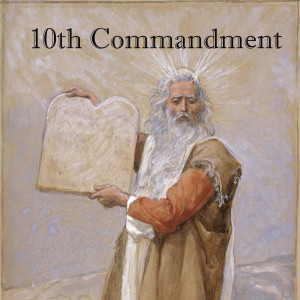
Friday Aug 07, 2020
The Tenth Commandment
Friday Aug 07, 2020
Friday Aug 07, 2020
"You shall not covet your neighbour's house; you shall not covet your neighbor’s wife, nor his manservant, nor his maidservant, nor his ox, nor his donkey, nor anything that is your neighbor’s." Exodus 20:17
In this final commandment episode, we discuss the following questions...
What is the link between this Commandment and with Commandment Nine, which says ‘do not bear false witness against your neighbor? And also what is the link between this one and Commandment One -‘I am The Lord your God have no other gods before me?
Many people seem to have a ‘the world owes me a living mentality’. Is there a resentful kind of coveting in this attitude? What about in people protesting for their special identity demands in society? Is this attitude linked to coveting?
In Romans 7, did Paul discuss a unique struggle with coveting specific to him, or is there a general principle? And how did the Commandment come alive to him and kill him?
What do you see as the transformational aspect of this Commandment in the New Testament Scriptures?
Paul tells us about his breakthrough in Philippians where he says he learned to be content…
Philippians 4 :11 I have learned in whatever situation I am to be content (safeguarded like a walled city). I know how to be brought low, and I know how to abound. In any and every circumstance, I have learned the secret of facing plenty and hunger, abundance and need. I can do all things through him who strengthens me.
God makes available a revelation of His grace, and the contentment that can be ours by accepting the godliness of our true self instead of an image we have constructed for our fulfilment.
The answer is taking hold of Commandment One which is always available and always the answer. It is always being at home with God where things work out okay just as they should because he runs that home and we are part of it.
Click here to see a chart showing the progression of the Commandments
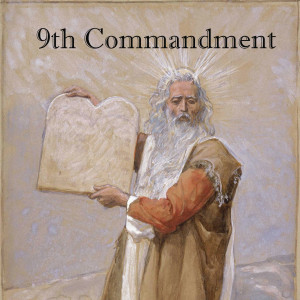
Wednesday Jul 08, 2020
The Ninth Commandment
Wednesday Jul 08, 2020
Wednesday Jul 08, 2020
"You shall not bear false witness against your neighbour. You shall not bear false witness against your neighbour." Exodus 20:16
Does this Commandment only deal with what we say about our neighbour, or does it include what we say about God?
It includes what we say about God because he wants there to be a true witness of himself in the earth. So when we discuss bearing false witness it is important that we also discuss true witness, and God is also person and therefor is also out neighbour.
Truth about God comes from God himself as his revelation or self revealing through his Word and his creation and the things that he does for us to see.
God is before all things. This is sometimes called the ‘prevenient grace of God’ God has acted upon us first and is always acting upon us. Atheists would say no – you thought God up. I say no to that - he thought us up.
What about scientific truth – Is not that an honest representation of what is?
Yes it is. However science is continually finding that it can observe ‘what is’ far more accurately than it used to. What has been concealed can now be more readily revealed because of new technology and instrumentation especially regarding the observation of the galaxies and the laws of motion. Truth is ‘what is’ The word in the Greek used in the Bible is ‘alethinos’, which means ‘that which is not concealed’, IE, ‘that which is revealed’.
What is the difference between scientific objectivity and faith.
The Bible says ‘faith is the evidence of things not seen’ Scientific enquiry would once perhaps scoffed at that statement but it now uses the same framework of enquiry into ‘what is’. Physicists referred to the phenomenon of what appeared to be the possibility of one particle being in two places at the same time (The Higgs Boson) as the "God Particle". It took nearly half a century and a multi-billion dollar particle accelerator to observe this. In the meantime the reality of this had to be ‘assumed’ as true before it could be seen because of their brilliant mathematical conclusion – so - ‘faith is the evidence of things not seen’.
So how does this Commandment relate to the one before it regarding our relationships with one another?
The best way of linking them is to start with the relational failure that occurs with Commandment eight, being about the devaluing of another person’s possessions and their entitlement to them, and Commandment nine being about the devaluing of another person’s name and reputation and honour - their essential being or nature.
Click here to see a chart showing the progression of the Commandments
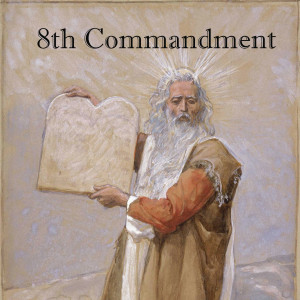
Wednesday Jul 01, 2020
The Eighth Commandment
Wednesday Jul 01, 2020
Wednesday Jul 01, 2020
"You shall not steal." Exodus 20:15
How does failure in the seventh commandment lead to a problem in the eighth Commandment?
In the last commandment, which dealt with unfaithfulness and infidelity in relationships, we saw that materialism began to establish itself in the heart of that person, so that self gratification and things that people could have or indulge themselves in became more important than other people and their needs and feelings.
So people start to take for themselves. They become takers instead of givers.
How does the New Testament expand the meaning this Commandment like it has with all the other Commandments?
The apostle Paul wrote concerning the transformation of a thief.
Ephesians 4:28 Let him who stole steal no longer, but rather let him labour, working with his hands what is good, that he may have something to give him who has need.
This scripture shows that the total transformation is that a taker becomes a giver. And on the way to becoming a giver the thief also becomes an honest worker. this commandment then, is more than just about stealing, but about a change of heart that brings a person into the full understanding of their own, and other people's worth. That scripture actually covers three areas in our lives, which are: Material honesty, productivity, and generous giving.
Would you see tithing being related to this Commandment, because the Scripture says in Malachi 3 :8 Will a man rob God? Yet you have robbed Me! But you say, "In what way have we robbed You?" In tithes and offerings.'
It is because we acknowledge God's ownership of everything that we tithe to Him. Many who disagree with tithing believe that tithing belongs under the law of Moses, and therefore has been done away with in the New Testament. That is not true. Tithing began before Moses was born, and was first performed by Abraham as a relational act of worship, when he called God 'The possessor of Heaven and earth' (Genesis 14:22).
Do Christians have to tithe today?
I do not believe that Christians are under the Law as regards tithing. I believe there needs to be a revelation of tithing as an act of relational worship towards a person, God, in fact Jesus, rather than a legalistic obligation.
There is a Bible principle that giving generously causes people to give back to you. Luke 6:38 – For if you give, you will get! Your gift will return to you in full and overflowing measure, pressed down, shaken together to make room for more.
Yes it seems to speak for itself and many people can testify to the fact that it works. And it is not just about money-it works for anything that is given out of a giving heart.
This Scripture describes that faith principle that releases a miraculous increase of what is given out of a right heart, like you just said about the giving person.
Click here to see a chart showing the progression of the Commandments
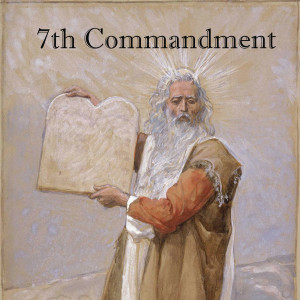
Wednesday Jun 24, 2020
The Seventh Commandment
Wednesday Jun 24, 2020
Wednesday Jun 24, 2020
“You shall not commit adultery." Exodus 20:14
There is a generally accepted definition of adultery which is in line with the Scriptures and it is ‘Unlawful sexual intercourse with married people’ – So this now depends upon what ‘Unlawful’ means
Lawful can change but what does not change is the spirit of adultery. It was lawful for Sarah to give Hagar to Abraham to have a child because if a woman was barren she could give her handmaid to her husband as a surrogate mother. It is unlawful in most of western society for a man to have two wives – bigamy, but it is not unlawful to commit adultery, but it used to be grounds for divorce in Australia till 1975. There are legal definitions of adultery in the American States of N Carolina, Minnesota and Virginia. And the commandment itself, and the spirit of adultery, or infidelity takes a lot more into account. Jesus once again expanded on this commandment in the sermon on the mount.
Jesus once again expanded on this commandment in the sermon on the mount.
Matthew 5:27-28. 'You have heard that it was said to those of old, "You shall not commit adultery." 28. 'But I say to you that whoever looks at a woman to desire to have her has already committed adultery with her in his heart.
From what Jesus said in that Scripture we can see that it deals with the whole sphere of unfaithfulness or infidelity, wrong desires, and excessive self-indulgence.
The self-indulgence part is one of the biggest factors that drives the rest because the commandment is about commitment to another person and their needs. Excessive self indulgence is about no one else’s needs but our own.
DOES PROSTITUTION COME INTO THE CATEGORY OF ADULTERY?
Prostitution more of an expression of the next commandment – number eight, because it is as much about materialism as relational infidelity - It’s the money for the prostitute but the spirit of adultery for the man/woman.
IS PORNOGRAPHY PART OF COMMANDMENT SEVEN?
In the sexual area pornography seems to top the list. It is an addictive behavior that allows a person to isolate themselves and be gratified rather than engage meaningfully in fulfilling relationships and be satisfied. Also in the area of sensual gratification and outside of the sexual area are found things like over-eating, and drug abuse which includes alcoholism, and the abuse of prescription drugs, as well as the abuse of narcotics, and stimulants. At first glance, these pursuits and activities might seem to be rather 'private' habits, which do not involve causing harm to other people, but really they destroy themselves, their families and everyone else in their world.
Click here to see a chart showing the progression of the Commandments
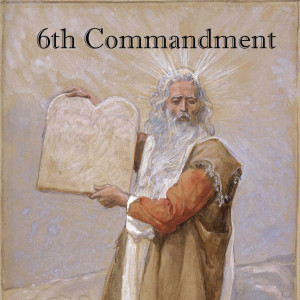
Wednesday Jun 17, 2020
The Sixth Commandment
Wednesday Jun 17, 2020
Wednesday Jun 17, 2020
"You shall not kill." Exodus 20:13
This Commandment is about much more than murder or killing – It is about the killing of relationships through anger and lack of emotional control.
This commandment speaks about more than just the act of taking of life in general, but is concerned with the heart attitude of malice, which can start with frustration, then resentment, then even vengeance or letting hatred or some other hurtful intention harm another person. Jesus enlarged on this commandment in the sermon on the mount.
Matthew 5:21-24 It has been written in the commandment, "You shall not kill." And whoever murders will be in danger of the judgment. 22. 'But I say to you that whoever is angry with his brother without a cause shall be in danger of the judgment…'Therefore if you bring your gift to the altar, and there you remember that your brother has something against you, 24. 'Leave your gift there before the altar, and go your way. First be reconciled to your brother, and then come and offer your gift.
The transformational aspect of this Commandment is in forgiveness and reconciliation. And it also talks about bringing your gift to the altar, so it also looks like it involves an attitude towards God as well.
There is always the redemptive process of God on the positive side to transform us like all the commandments. This is in the context of people getting offended and angry – and that kills relationships and the remedy for that is this process of forgiveness and reconciliation.
The attitudes of relationship in Commandment five were about trust and care and that ties in with this Commandment. It is this the link between five and six.
In the last commandment (Number five) , which is about our relationship with authority, we saw that the problem with people, was the inability to trust another person to influence or direct their life – it started with parents and children This was because of self-determination, so that they could have their own way. And now we see that the person who has a mistrust of authority, will act out this mistrust with other people generally, and, still determined to have their own way, will behave in a way that is destructive of all relationships – so they get angry.
What are some of our defence mechanisms and how effective are they?
And what about our self -made relational or emotional defence mechanisms?
The most subtle and dangerous of our defense mechanisms are those negative relational ones that we use as weapons or as shields against other people – and there are three interesting ones like withdrawal, resistance, and aggression.
Click here to see a chart showing the progression of the Commandments
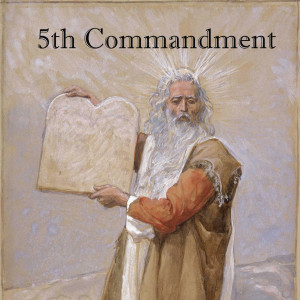
Wednesday Jun 10, 2020
The Fifth Commandment
Wednesday Jun 10, 2020
Wednesday Jun 10, 2020
"Honour your father and your mother, that your days may be long upon the land which the Lord your God is giving you." Exodus 20:12
How do the next six commandments from Commandment Five to Commandment Ten differ in nature from the first four commandments?
These next six commandments differ from the first four because there is a new framework of relationships. The first four commandments dealt with our relationship to God and the next six deal with our relationships to one another. The relational scope of the Ten Commandments is for us to live in harmony with God AND at peace with other people.
The Fifth commandment tells children to obey their parents. This only seems to be written to children – or is there another way to apply this to us all as adults?
The fifth commandment ALSO teaches us how to understand and respect the nature of authority itself, as it brings order into our lives at many levels. God ordains authority to be instrumental as the ordering of our relational reality. In thus Commandment we see how life now becomes a series of lessons divinely designed starting with this commandment and through the following commandments to transform our hearts relationally till we learn to live in harmony and order with other people.
What are some other areas of responding to authority as we grow up?
After experiencing parental authority there is school life, and that is mentioned in the Bible. (Galatians 4:2)
Then a young adult comes under the authority of his employer in the work place (Colossians 3:22-4:1).
Then we all come under the authority of the State (Romans Ch.13).
There is also the authority structure of the Church (Hebrews 13:17).
Note: All of the above authority structures operate under a two way agreement between those in authority and those under authority – AND – All authority is under God Who also operates under a two way agreement with us through His Covenants.
Click here to see a chart showing the progression of the Commandments
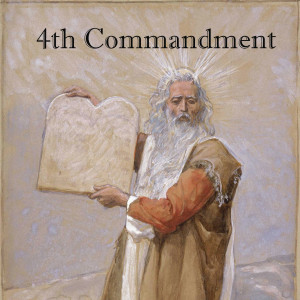
Wednesday Jun 03, 2020
The Fourth Commandment
Wednesday Jun 03, 2020
Wednesday Jun 03, 2020
"Remember the Sabbath day, to keep it holy. Six days you shall labor, and do all your work, but the seventh day is a Sabbath to the LORD your God. On it you shall not do any work, you, or your son, or your daughter, your male servant, or your female servant, or your livestock, or the sojourner who is within your gates. For in six days the LORD made heaven and earth, the sea, and all that is in them, and rested on the seventh day. Therefore the LORD blessed the Sabbath day and made it holy." Exodus 20:8–11
Some Christians DO observe the 7th Day as their Sabbath, but Most Christians don’t keep this one. So who is right and who is wrong?
For this Commandment the question of right and wrong involves the problem of us judging one another, as we do about many other things. It was a contentious issue between the Pharisees and Jesus in the Gospels and between Christians in the early church in the epistles. And we still judge each other today.
Romans 14:1-6. Receive one who is weak in the faith, but not to disputes over doubtful things...One person esteems one day above another; another esteems every day alike. Let each be fully convinced in his own mind. He who observes the day, observes it to the Lord; and he who does not observe the day, to the Lord he does not observe it.
What is the Scriptural reason for most Christians to not observe the 7th day?
New Testament scripture reveals that this commandment refers not to a ritual observance of one day in each week, but to the every-day life of faith, which is the rest that we enter into as Christians, in the finished work of Christ. This rest is spoken of in the epistle of Paul to the Hebrews.
Hebrews 4:9-11 There remains therefore a rest for the people of God. 10. For he who has entered His rest has himself also ceased from his works as God did from His. Let us therefore be diligent to enter that rest, lest anyone fall after the same example of unbelief and disobedience.
ALSO
Colossians 2:16-17 Therefore let no one judge you in food or in drink or regarding a festival or a new moon or Sabbath days, 17. which are a shadow of things to come but the substance is of Christ.
Did Israel fully obey the Sabbath Rest?
Yes and no. They obeyed the seventh day but they missed the essential aspect of FAITH and trust in God. They were told to rest for one year in seven and enjoy relating to each other as a family and a community together and to watch God supernaturally grow the crops for them. So they failed to observe that for 490 years since the time of King Saul. Divide 490 by seven and you get seventy. The bible says that they would go into captivity for 70 years in Babylon because they failed to give the land rest…
2 Chronicles 36:20-21 And to those who escaped from the sword he carried away to Babylon, where they became servants to him and his sons until the reign of the kingdom of Persia, 21. to fulfil the word of The Lord by the mouth of Jeremiah, until the land had enjoyed her Sabbaths, ... to fulfil seventy years.
ALSO (concerning Israel)
Hebrews 4:4 For the Scripture mentions the seventh day saying: “And God rested on the seventh day from all His works”; and in another place: “They shall not enter My rest.”
Click here to see a chart showing the progression of the Commandments
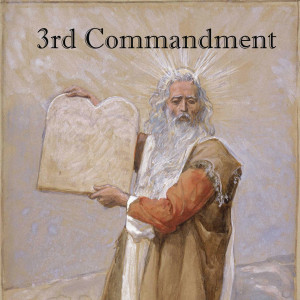
Monday May 25, 2020
The Third Commandment
Monday May 25, 2020
Monday May 25, 2020
"You shall not take the name of the LORD your God in vain, for the LORD will not hold him guiltless who takes his name in vain." Exodus 20:7
Does this Commandment mean more than just people using God’s name in swearing?
How do Christians use God’s name in vain?
What does God’s name mean?
What does it mean for God to ‘not hold people guiltless’ for taking his name in vain?
Does this Commandment operate for people who do not believe in God?
All the commandments deal with relationships, and this commandment focuses on a very real aspect of a relationship, and a very important aspect, which is the name of the Person with whom we have a relationship. It is bad enough to have one's name forgotten, but even worse, to have it abused or exploited.
Don’t rob God’s name of its meaning and power by using it to promote your own futile campaign. God does not count such harmful schemes as innocent (not hold him guiltless).
Seeking of endorsement for our own name is really the seeking of endorsement for the self -images that we have been building, according to the fault addressed in the previous commandment which was the making and serving of images.
It is the basic insecurity within every image-maker that does not trust in God that creates a compulsion to attach credibility to that image by borrowing the fame or success of someone else's achievement or reputation.
Click here to see a chart showing the progression of the Commandments
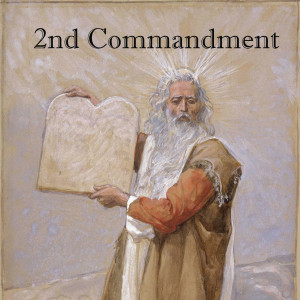
Tuesday May 19, 2020
The Second Commandment
Tuesday May 19, 2020
Tuesday May 19, 2020
"You shall not make for yourself any carved image, or any likeness of anything that is in heaven above, or in the earth beneath, or that is in the water under the earth; You shall not bow down to them nor serve them. For I, The Lord your God am a jealous God" Exodus 20:4
Is idolatry a rare occurrence these days or does it abound prolifically in today’s world?
Do idols have supernatural power?
Does everyone have a self image and is it idolatry?
How does a person develop a self image?
What does it mean that God is a jealous God?
For Israel the golden calf was a confused concept of what Israel thought to be God Himself. It was a substantial thing made of wood and gold plated because they had to relate to something tangible that they could make themselves. Their concept was shaped by their past experience.
Our working model self image is an outcome of what is reflected back to us by others throughout our life - of -who -we -are, which has a mixture of either helpful and loving feedback or harmful and negative feedback. This working model of a self image is incomplete and distorted however it is perceived. Its perception of itself is flawed. It is always looking in a mirror at itself and doesn’t know who it is seeing.
We can be tempted to make a better self image for ourselves by having a better position in life, by way of a more prestigious job or status of some kind, and life can become an endless pursuit for this kind of self-worth
The truth is we have been created in God’s image to become the unique person we were created to be. To find that we have to go on a journey of trust in God to reveal to us our special giftings and abilities as well as our shortcomings
Click here to see a chart showing the progression of the Commandments
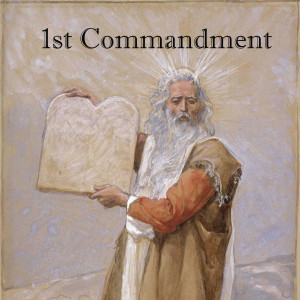
Monday May 11, 2020
The First Commandment
Monday May 11, 2020
Monday May 11, 2020
"I am the LORD your God, who brought you out of the land of Egypt, out of the house of slavery. You shall have no other gods before me." Exodus 20:2-3
Is it logical to say that if people would have obeyed the First Commandment there would be no need for any other Commandments?
This commandment is actually the be-all and end-all of the commandments. It tells us that we should look to no other person or thing than God Himself for our ultimate meaning, purpose, and fulfillment.
Are the Ten Commandments actually a Biblical course in character growth?
The first commandment begins a logical sequence of challenges to faith and obedience that produce a process of spiritual and emotional growth to maturity. The next commandment, which deals with the making of images, only becomes relevant when a person has not remained dependent upon God as the source and means and end of his life, and so builds for himself or looks to some other source, or finds some other means of strength that becomes a 'god' to him.
How does emotional pain and abuse affect a person’s ability to accept support and comfort?
God had to release Israel from bondage before He could give them the commandments. He knew that the bondage had caused bitterness in their souls by reason of their cruel taskmasters in Egypt, and His loving response to them was one of compassion.
God told Moses to tell them of His promises for them, but they were unable to respond. God's most formidable task was to convince them of His love for them, let alone transform them.
Why do people resist putting God first in their lives?
We can only be transformed when we see the need for that change of heart and mind, and many people do not realise how much they need to be changed, and so they resist it.
Click here to see a chart showing the progression of the Commandments
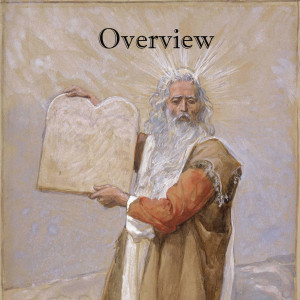
Thursday Apr 30, 2020
The Ten Commandments Overview
Thursday Apr 30, 2020
Thursday Apr 30, 2020
In this series, Pastor Paul O'Sullivan is interviewed by Scott Kardash about the transformational nature of the 10 Commandments.
Weren’t the Ten Commandments given in the Old Testament as part of the Jewish law that doesn’t apply to Christians?
What is the cyclic structure of the Ten Commandments?
How can the Ten Commandments be used as a diagnostic tool?
Relationship is the key value in the whole theme of the commandments, because God wants us to be fulfilled in life through relationships, both with Himself, and with one another.
God has designed the Commandments as a sequence of steps where success in any one commandment leads to an understanding of the next.
Another Divine design is that the growth pattern of the ten commandments is not like going up a stairway, it is a circular spiral that takes us all the way around to commandment number ten, and then leads us right onto commandment number one again.
At any point of failure at some level of experience, we need to go back to the previous commandment, and let The Holy Spirit reveal truth to us in this way.. This also affords a most effective chart of diagnosis for the serious counsellor who wants to see a life transformed by the truth and power of The Holy Spirit.
Click here to see a chart showing the progression of the Commandments
Contact us at uncreatedpodcast@gmail.com
